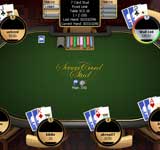Free Seven Card Stud Poker Game

Dealing a Seven Card Stud Poker Game
Before the Deal
- Players will buy-in for the posted amount. No short buys are permitted.
- Players will place an ante into the pot by selecting "I'm in." Your ante will be placed into the pot by default. You may turn off this feature under the settings menu in the game.
Opening Deal
The dealer always deals first to the player closest to the dealer's left and, moving clockwise around the table, will "deal-in" each player. The players will be dealt one card face down, then a second card face down, AND then a third card known as the "door card" will be dealt face up. A round of betting will occur starting with the player with the lowest card by value and suit. This is known as the "force" or "bring-in" bet.
The player with the lowest card value (ace being high) will be the force. In the event that two or more players hold door cards of the same rank, then the lowest suit will make the determination. Suits are ranked, from highest to lowest alphabetically, spades, hearts, diamonds, clubs (i.e., the two of clubs is the lowest possible card). This is the only time suits will play a role in the game. |
Fourth Card (4th Street)
The next card to be dealt into the game will be the fourth card the players will receive in their hand. This is called "4th street." The dealer will burn one card off the top of the deck and then always deals to the player closest to the dealer's left and, moving clockwise around the table, will deal each one card face up. A round of betting will occur starting with the player with the highest two-card value. This is known as "having the action."
The player having the best hand on the board "has the action" and may make the initial bet of the round or check to the next player. If there is a tie between players as to the best hand, then the player closest to the dealer's left will have the action. |
In fixed limit stud (i.e., a 4-8 game, as opposed to a 1 to 5 game), if any player displays an open pair on fourth street, that player may bet the higher amount of the game limit normally not available until fifth street.
If the player with the action chooses to make the lower limit bet, any other player still in the hand may choose to make either the lower limit or higher limit raise. Once any player has made the higher limit bet, all further bets and raises must be made at the that higher level
Betting in Seven Card Studa) If you choose not to bet, then you are said to "check," or pass on the option to bet to the next player.
b) If another bets, you may "call" the bet, "raise" or "fold."
c) If a player checks and another player makes a bet, the player who checked may in turn raise the bet made by the other player. This is called a "check & raise."
Players have 10 seconds to bet, raise or fold. |
Fifth Card (5th Street)
The next card to be dealt into the game will be the fifth card the players will receive in their hand. This is called "5th street." The dealer will burn one card off the top of the deck and then always deals to the player closest to the dealer's left and, moving clockwise around the table will deal each one card face up. A round of betting will occur starting with the player with the highest three-card value. Starting with fifth street, and continuing through all further streets, all bets and raises in fixed limit games are made at the higher limit.
Sixth Card (6th Street)
The next card to be dealt into the game will be the sixth card the players will receive in their hand. This is called "6th street." The dealer will burn one card off the top of the deck and then always deals to the player closest to the dealer's left and, moving clockwise around the table will deal each one card face up. A round of betting will occur starting with the player with the highest four-card value.
Seventh Card (the River)
Almost every poker player uses the term "the river" or "river" to describe the last card players will receive in the game. As always, we start with a burn card. The dealer will deal a card face down clockwise around the table.Exception!
If there are 8 players who played all the way through the sixth card and are now about to be dealt their final card of the game, our dealer will only have one (1) card remaining in the deck. That's because 8 X 6 = 48 cards + the 3 burn cards that we burned on 4th, 5th and 6th streets will be a sum of 51 cards. Our rule in the case is as follows:
In the event there may not be enough cards remaining in the deck to deal each player a final card, the dealer will calculate if the burn cards plus any cards in the deck will allow each player to receive a final down card. If the dealer can deal each player a last card, then the dealer will do so by taking all the burn cards plus any remaining cards in the deck, shuffle and then deal the final card to each player. |
However, if the dealer calculates that it's not possible to give each player his or her own card, then the dealer will take all the burn cards, shuffle and turn over a "community card." The folded (muck) cards may never be used in the game once they have been folded.
ShowdownWho shows first?
In a live game, generally players who feel that they have a good opportunity to win a pot will show their hand voluntarily. However, in many instances, players all stare at each other wondering who will show their cards first. To avoid this situation, our game will employ the following standard rule:
The determination of which players' cards will and must be shown first will lie with the player who had initiated the action or with the person, who had initiated the last bet, raise or re-raise. |
This simply means that whoever created the last action on the river must show his/her cards first. If the player who had the action checked and all players checked, then the player who had the initial option to bet would show first. If a player checks and another player bets, then the player who bet will have his/her cards shown first. If a player checked, another bets and then another player raises, the raiser's cards will be shown first.
Suppose a player wins by default. Is the hand required to be shown?
Players that have won a pot do not have to show their cards if they were not called. |
This means that if two or more players were playing and one player bets and the other(s) fold, then, the player who has won the pot by default will not under any circumstances have their cards shown automatically. The winning players may choose to "show" or "don't show."
Do players have to show their cards if they call a bet or a check on the River?
Players are not required to show their cards if and only if they are not the player who created the last action by betting or raising. If a player calls a bet and sees that they cannot win, they may "fold" or "show" their cards. However, if a player who has stayed in until the end mucks (fails to show) his hand, other players in the game may find out the hand by requesting that a hand history be emailed to them. |
Who wins?
In our poker room, as with all, "Cards Speak." That means our dealer will find the best 5-card hand on the table and declare it the winner based on the universal poker hand rankings. It is theoretically possible that two or more players can hold the best five-card hand. If there is a tie between two or more players, then the dealer will "split" the pot equally between all the winning players. |
$1-2 Through $20-40 Seven Card Stud Poker Game Notable Rules "Fixed Limit Games"
Most commonly called "fixed" limit games, this type of game limit structure is by far the most common betting structure you will find in the casinos. A fixed limit game is one in which each bet will remain consistent through several betting rounds and then change at some predetermined point in later rounds. All bets will remain equal to the posted table limit. For example, in a 5-10 Seven-Card Stud game, the bets will be as follows.
In the early betting rounds, a bet and any raises must be exactly $5. In later betting rounds, such as the last round, a bet and any raises must be exactly $10.
How do you bet & raise in a fixed limit game?a) Each bet in every betting round will be in strict compliance with a structured game.
b) If you choose not to bet, then you are said to "check," or pass on the option to bet to the next player.
c) If a player bets, you may "call" the bet or "fold."
d) If a player checks and another player makes a bet, the player who checked may then in turn raise the bet made by the other player. This is called a "check & raise."
Players have 10 seconds to bet, check, raise or fold. |
How many raises will be allowed?
The general poker rule is a "cap" of three raises allowed per betting round with three or more players. However, if there is a "heads up" situation whereby only two players remain in the game, then raises are unlimited. |
The opening round will be a force wager determined by the game limit. The player with the lowest "door card" is forced to wager the minimum or a player may open for the lower limit of the game. If another player wishes, they may "raise" the bet and "complete" it to the lower limit of the game in the event the player with the force wagered just the force amount. This is not a raise in the traditional sense. The player is only "bringing up" the bet to its normal minimum.
Fourth Street: The bet shall be the lower limit and all raises will be in the same increments only.
However, an exception occurs on Fourth Street when there is an open pair on the table. Any player may bet or raise the lower or higher limit of the game. This is called the "Fourth Street Rule." |
Fifth Street: The bet shall be the higher limit and all raises will be the same increments only.
Sixth Street: The bet shall be the higher limit and all raises will be the same increments only.
Seventh Street or the river: The bet shall be the higher limit and all raises will be the same increments only.
Seven Card Stud Poker Games
10¢-20¢ Stud | 25¢-50¢ Stud | 50¢-$1 Stud |
Maximum number of players:8 | Maximum number of players:8 | Maximum number of players:8 |
Buy-in: $1 | Buy-in: $2.5 | Buy-in: $5 |
Ante: $.05 | Ante: $.12 | Ante: $.25 |
Force: $.1 | Force: $.25 | Force: $.50 |
4th street $.1 ($.1 or .2 w/ pair) | 4th street $.25 ($.25 or .5 w/ pair) | 4th street $.5 ($.5 or 1 w/ pair) |
5th street: $.2 | 5th street: $.5 | 5th street: $1 |
6th street: $.2 | 6th street: $.5 | 6th street: $1 |
7th street: $.2 | 7th street: $.5 | 7th street: $1 |
Cap at 3 raises | Cap at 3 raises | Cap at 3 raises |
$1-2 Stud | $2-4 Stud | $3-6 Stud |
Maximum number of players:8 | Maximum number of players:8 | Maximum number of players:8 |
Buy-in: $10 | Buy-in: $20 | Buy-in: $30 |
Ante: $.1 | Ante: $.2 | Ante: $3 |
Force: $.2 | Force: $.4 | Force: $6 |
4th street: $1 ($1 or 2 w/ pair) | 4th street: $2 ($2 or 4 w/ pair) | 4th street $3 ($3 or 6 w/ pair) |
5th street: $2 | 5th street: $4 | 5th street: $6 |
6th street: $2 | 6th street: $4 | 6th street: $6 |
7th street: $2 | 7th street: $4 | 7th street: $6 |
Cap at 3 raises | Cap at 3 raises | Cap at 3 raises |
$5-10 Stud | $10-20 Stud |
Maximum number of players:8 | Maximum number of players:8 |
Buy-in: $50 | Buy-in: $100 |
Ante: $5 | Ante: $10 |
Force: $10 | Force: $20 |
4th street: $5 ($5 or 10 w/ pair) | 4th street: $10 ($10 or 20 w/ pair) |
5th street: $10 | 5th street: $20 |
6th street: $10 | 6th street: $20 |
7th street: $10 | 7th street: $20 |
Cap at 3 raises | Cap at 3 raises |
Related Articles
| Poker Overview | Poker School | Poker Tournaments General Poker Policies |







